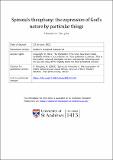Files in this item
Spinoza’s theophany : the expression of God’s nature by particular things
Item metadata
| dc.contributor.author | X. Douglas, Alexander | |
| dc.date.accessioned | 2023-05-05T11:30:08Z | |
| dc.date.available | 2023-05-05T11:30:08Z | |
| dc.date.issued | 2023-02-22 | |
| dc.identifier | 283067402 | |
| dc.identifier | 5bb6fd7d-7ec4-41be-8b1f-5e0ce6d556cb | |
| dc.identifier.citation | X. Douglas , A 2023 , ' Spinoza’s theophany : the expression of God’s nature by particular things ' , Journal of Early Modern Studies , vol. 11 , no. 2 , pp. 49-69 . https://doi.org/10.5840/jems202211213 | en |
| dc.identifier.issn | 2285-6382 | |
| dc.identifier.other | ORCID: /0000-0001-9486-8991/work/134491388 | |
| dc.identifier.uri | https://hdl.handle.net/10023/27519 | |
| dc.description.abstract | What does Spinoza mean when he claims, as he does several times in the Ethics, that particular things are expressions of God’s nature or attributes? This article interprets these claims as a version of what is called theophany in the Neoplatonist tradition. Theophany is the process by which particular things come to exist as determinate manifestations of a divine nature that is in itself not determinate. Spinoza’s understanding of theophany diverges significantly from that of the Neoplatonist John Scottus Eriugena, largely because he understands the non-determinateness of the divine nature in a very different way. His view is more similar, I argue, to what is presented in the work of Ibn ‘Arabī, under the name “tajallī”. | |
| dc.format.extent | 21 | |
| dc.format.extent | 382108 | |
| dc.language.iso | eng | |
| dc.relation.ispartof | Journal of Early Modern Studies | en |
| dc.subject | Spinoza | en |
| dc.subject | Eriugena | en |
| dc.subject | Ibn ‘Arabī | en |
| dc.subject | Expression | en |
| dc.subject | Modes | en |
| dc.subject | Divine nature | en |
| dc.subject | Indeterminacy | en |
| dc.subject | Superdeterminacy | en |
| dc.subject | Theophany | en |
| dc.subject | tajallī | en |
| dc.subject | BJ Ethics | en |
| dc.subject | T-NDAS | en |
| dc.subject | MCC | en |
| dc.subject.lcc | BJ | en |
| dc.title | Spinoza’s theophany : the expression of God’s nature by particular things | en |
| dc.type | Journal article | en |
| dc.contributor.institution | University of St Andrews. Centre for Energy Ethics | en |
| dc.contributor.institution | University of St Andrews. Philosophy | en |
| dc.identifier.doi | 10.5840/jems202211213 | |
| dc.description.status | Peer reviewed | en |
This item appears in the following Collection(s)
Items in the St Andrews Research Repository are protected by copyright, with all rights reserved, unless otherwise indicated.

